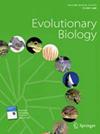癌症的进化过程
IF 1.7
2区 生物学
Q3 EVOLUTIONARY BIOLOGY
引用次数: 0
摘要
癌症是通过多细胞体内体细胞的进化而发展起来的。常见的生物进化动力学,包括突变、自然选择、基因漂移和迁移,也发生在多细胞生物的细胞中。在某些情况下,但不是所有情况下,这些进化过程会导致癌症。这对我们理解癌症、治疗和预防癌症有着深远的影响。我们所有的医疗干预措施都对肿瘤中数十亿细胞的异质性群体施加了选择性压力,并倾向于选择对干预有抵抗力的突变细胞,无论干预是药物、辐射、免疫系统还是任何其他已经尝试过的方法。我们可能需要对癌症采取进化和生态学方法来管理其进化,以应对我们的干预措施。癌症的进化生物学和生态学领域还很年轻,相对较小。我们正处于将进化生物学和生态学的思想和工具转化为研究和管理癌症的早期阶段。迫切需要更多具有进化生物学和生态学专业知识的研究人员将他们的技能和想法应用于癌症。目前,需要解决的重要问题远远多于需要解决的人。本文章由计算机程序翻译,如有差异,请以英文原文为准。
Evolutionary Processes in Cancer
Cancer develops through the evolution of somatic cells in multicellular bodies. The familiar dynamics of organismal evolution, including mutations, natural selection, genetic drift, and migration, also occur among the cells of multicellular organisms. In some cases, but not all, these evolutionary processes lead to cancer. This has profound implications for both our understanding of cancer and our treatment of the disease, as well as its prevention. All of our medical interventions impose selective pressures on the heterogeneous populations of billions of cells in tumors, and tend to select for mutant cells that are resistant to the intervention, regardless of whether the intervention is a drug, radiation, the immune system, or anything else that has been tried. We will likely need evolutionary and ecological approaches to cancer to manage its evolution in response to our interventions. The field of the evolutionary biology and ecology of cancer is still young and relatively small. We are in the early stages of translating ideas and tools from evolutionary biology and ecology to study and manage cancers. There is a desperate need for more researchers with expertise in evolutionary biology and ecology to apply their skills and ideas to cancer. Currently, there are far more important questions that need to be addressed than there are people to address them.
求助全文
通过发布文献求助,成功后即可免费获取论文全文。
去求助
来源期刊

Evolutionary Biology
生物-进化生物学
CiteScore
3.80
自引率
4.00%
发文量
25
审稿时长
>12 weeks
期刊介绍:
The aim, scope, and format of Evolutionary Biology will be based on the following principles:
Evolutionary Biology will publish original articles and reviews that address issues and subjects of core concern in evolutionary biology. All papers must make original contributions to our understanding of the evolutionary process.
The journal will remain true to the original intent of the original series to provide a place for broad syntheses in evolutionary biology. Articles will contribute to this goal by defining the direction of current and future research and by building conceptual links between disciplines. In articles presenting an empirical analysis, the results of these analyses must be integrated within a broader evolutionary framework.
Authors are encouraged to submit papers presenting novel conceptual frameworks or major challenges to accepted ideas.
While brevity is encouraged, there is no formal restriction on length for major articles.
The journal aims to keep the time between original submission and appearance online to within four months and will encourage authors to revise rapidly once a paper has been submitted and deemed acceptable.
 求助内容:
求助内容: 应助结果提醒方式:
应助结果提醒方式:


